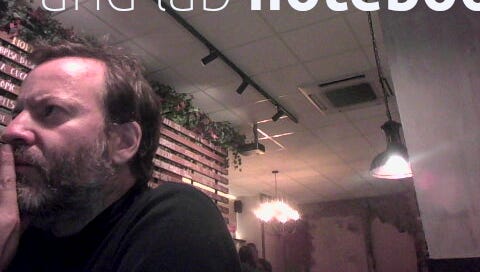Now that both the World Psychiatric Congress and my own event on ongoing cases of political abuses of psychiatry have come to an end, or are about to since there are still two days packed with sessions left of the latter this week, it is a good time for a recap on what other issues are on the table at the moment:
There will be a regular stream of video interviews posted. Meetings with leading cognitive scientists: that includes artificial intelligence developers, neuroscientists, anthropologists, linguists, and the rest of entourage. An interdisciplinary approach to the topic of acuity, resilience and recovery from the worse sort of trauma and disease. Most likely bi-weekly, starting with cutting edge medical expert systems developers as the first target group continuing my ongoing ethnographic work.
Several publications are ongoing: a Routledge Handbook chapter, an MDPI paper on expert systems in mental health, a national policy report, my own updated field-work plan to include the entirety of Nordic countries now that we have made the region our new base and homeland, a space medicine human factors literature review (with the most wonderful group of professionals involved, specially proud of this one), shared decision making aids, a Dr. Peter Lehmann (editor) book translation, and several other so-called minor deliverables.
A coding project of my own, already approved at experiment.com and awaiting for me to finalize preparatives and finish teaming up with other experts that can take it forward to the level that is required. Not much else to share at the moment on this one, other than it is an open source project, and a pilot one to actually implement and test best practices we are researching on and both (ex)patients and practitioners are providing the optimal specs of to optimize cognitive performance, endurance and recovery.
A two months Erasmus Staff training stay learning on A.I. and health, potentially followed in the next few months by a nine month longer grant and a new EU COST science and technology action one edtech for one health along with a network of over forty other experts from more than twenty countries. Without many more details allowed to be revealed as that would potentially consitute a disqualification factor at this stage.





Much of this work was completely undone by the events that occurred during the final two days of the summit on political abuses. Specifically, my two children were taken to an undisclosed location for months, and myself was death threatened as retaliation for my advocacy for human rights. Sadly, this situation is still ongoing.
Prior to that, I was subjected to beatings for years. These events, along with the gross incompetence of the relevant services, authorities, and other professionals—or their alleged inability to perform their duties to protect against crimes, serve honest citizens, and defend our most basic human rights—caused immense harm. The end result was the derailing of ongoing projects, severely impacting my personal life, my own kids wellbeing, and my own ability to perform at my best.
By that point, severe abuse, violent beatings, and other forms of aggression had sadly become routine, amounting to what could be described as domestic torture by the perpetrator(s). The taking of my children after even more aggressive violence marked a new low.
Whether these attacks and crimes against me were motivated by personal, political, or economic factors, they severely hampered all honest work and efforts.
Even more than six months later, authorities have failed to provide any assistance in stopping the criminals and ending the violence.